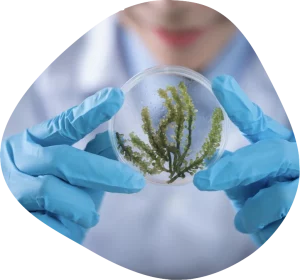Overview
What is an Environmental Scientist?
Environmental Scientists are professionals that study the impact of human activity on the natural environment. They are tasked with protecting both nature and human health, and achieve this by conducting scientific research and providing expert advice and guidance on conservation.
Environmental science is often conflated with ecology, but while these two fields have some similarities, their overall focus is different. Ecologists focus on the relationship between living organisms, while environmental scientists have a broader and more human-focused remit, assessing factors such as climate change and pollution.
How much do Environmental Scientists earn?
The average salary of an Environmental Scientist is usually between £18,000 – £45,000 a year.

Skills
What’s required for the role?
- Communication skills
- Problem solving
- Critical thinking
- Organisation
- Knowledge of green building certifications*
- Familiarity with environmental legislation
- Presentation and public speaking
- A research-driven mindset
- Experience with computer software
- Analytical thinking
- Comfort working with numbers and statistics
- Familiarity with interpreting and manipulating data
- Collaboration and teamwork
- An eye for detail
- Sustainability literacy
*more information about green building certifications
Details
What does an Environmental Scientist do?
An Environmental Scientist will have a variety of responsibilities in their role, including:
What is the work environment like?
An Environmental Scientist will conduct their work in a variety of locations. To collect samples for research and conduct inspections, they will need to make trips to environmental sites. These samples, results and data will then be analysed in an office environment or even a laboratory.
Environmental Scientists can be employed in various sectors and industries. These roles are present in both local and central government organisations and agencies, as well as in charities concerned with conservation and the natural environment.
Depending on their employer and the sector they work in, they may have to make visits to client offices and locations. This can influence the kinds of hours professionals should expect to be working, and as such, some projects may lead to them working irregular hours.
Opportunities
Is environmental science a good career?
As with many other professions in the environmental sector, this profession is a growing area in high demand, meaning there are good job prospects for aspiring professionals.
With fears around the impacts of climate change growing and environmental practices like Corporate Social Responsibility (CSR), Environmental, Social and Governance (ESG) and sustainability topping the agenda of many organisations, the expertise of Environmental Scientists will be critical in coming years. They can also expect long-term job security in their careers, as demand for their skills and knowledge is only growing.
There are also a wide range of specialisms you can pursue in environmental science to further your career, including:
- Waste management
- Environmental consulting
- Water quality science
- Environmental health

Become an Environmental Scientist
Who can work in environmental science?
Anyone with a passion for sustainability can pursue a career in environmental science. At UCEM, students from across the world have undertaken their studies and successfully entered a broad range of industries in the built environment. Find out about their experiences below:
-
- Why it’s never too late for a career change: a Q&A with UCEM Programme Leaders Jon Hubert and Nicola Allen
- From IT consultant to a real estate and sustainability thought leader – a student success story with Esha Bhasin MRICS
- Everyone can contribute to global change: a Q&A with UCEM Student Officer for Sustainability Kian Bruney
How to become an Environmental Scientist
A recruiter for a role in environmental science will typically expect applicants to hold a Bachelor’s Degree in this area or a related field.
Aside from traditional degrees, another option is to undertake an apprenticeship, which can boost your prospects by giving you practical work experience alongside relevant qualifications.
Along with obtaining degrees, online CPD courses in relevant subjects can strengthen your employment credentials, such as:








